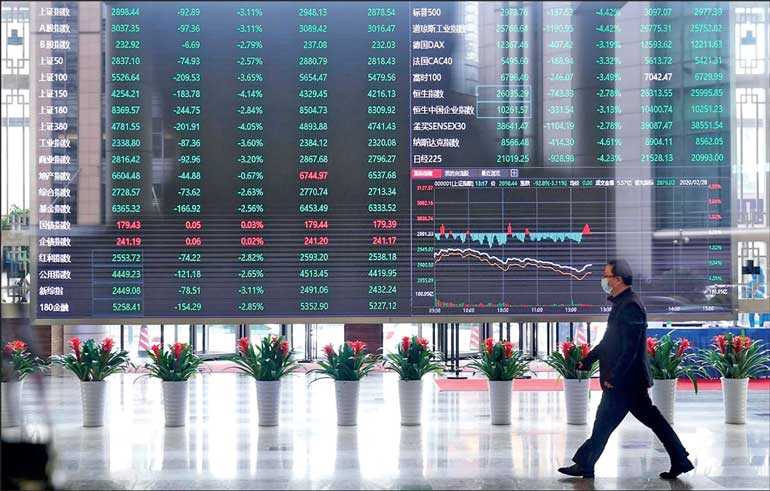Sunday Feb 22, 2026
Sunday Feb 22, 2026
Saturday, 25 July 2020 00:10 - - {{hitsCtrl.values.hits}}

FILE PHOTO: A man wearing a face mask is seen inside the Shanghai Stock Exchange building, as the country is hit by a novel coronavirus outbreak, at the Pudong financial district in Shanghai, China February 28, 2020. REUTERS
London/Sydney (Reuters): Global shares skidded further from five-month peaks on Friday as a bounce back in European business activity did little to ease the jitters surrounding Sino-US tensions, while gold approached a record high.
The mood darkened after Beijing ordered the United States to close its consulate in Chengdu, in retaliation for being told to shut its consulate in Houston earlier this week.
“An escalation in US-China tensions that could have hugely negative consequences on stock market leadership, particularly around the US tech giants, is worrying,” said International markets analysis and insights from Stephen Innes, Chief Global Market Strategist at AxiCorp.
“Even more so, if President Trump pulls the free pass into China, and things could turn quite ugly into the weekend as traders will have no option but pare risk.”
Unsurprisingly, Chinese blue chips led the declines, retreating 4.4%, wiping out a week of gains.
European shares were on course for their worst day in a month, with the pan-region Euro Stoxx 50 down 1.9%.
Technology stocks led losses, following their US peers overnight, while the China-sensitive basic materials sector lost 2.4%.
MSCI’s broadest index of Asia-Pacific shares outside Japan lost 1.9%. Tokyo was closed for a holiday, but Nikkei futures were trading 1% lower.
E-Mini futures for the S&P 500 edged down 0.8%.
Investors took little comfort from purchasing managers’ index (PMI) data which showed euro zone business activity bounced back to growth in July as more parts of the economy that were locked down to curtail the spread of the coronavirus reopened.
British businesses experienced the fastest upturn in five years during July and data for the United States follow later in the day.
The market’s dogged optimism on economic recovery had been challenged on Thursday by data showing the number of Americans filing for unemployment benefits unexpectedly rose last week for the first time in nearly four months.
The euro was at $1.16020, close to its highest level since October 2018, having enjoyed a winning streak for all of July, as the European Union’s passing of a 750 billion-euro recovery fund restored confidence.
The yen was up 0.6% at 106.25, its highest since June 23.
The Chinese yuan, a barometer of Sino-US tensions, looks set for its worst week in three months. It was down 0.2% at 7.0276 per dollar in the offshore market.
Italy’s 10-year bond yield was steady at around 1.05%, holding near Thursday’s 4-1/2 month low at 1.04%. Germany’s Bund yield was a touch lower on Friday at -0.49%.
The combination of super-loose money and negative real bond yields has burnished the attractiveness of gold, which pays no yield but is supply constrained.
The precious metal was last at $1,894.23 an ounce for its biggest weekly gain in more than three months as it held firm near a nine-year high.
Analysts at RBC Capital Markets noted gold-backed exchange traded product holdings had already reached record peaks.
“The level of COVID-19 uncertainty, low and negative real and nominal rates, politics and geopolitics have driven gold prices sharply higher, and pushed allocations among investors ever higher,” they said in a note.
Oil prices were ending the week on a flat note, having failed to hold a five-month high as worries about global demand offset a weaker US dollar.
Brent crude was down 1 cent at $43.30 a barrel, while US West Texas Intermediate (WTI) crude up 1 cent at $41.08.